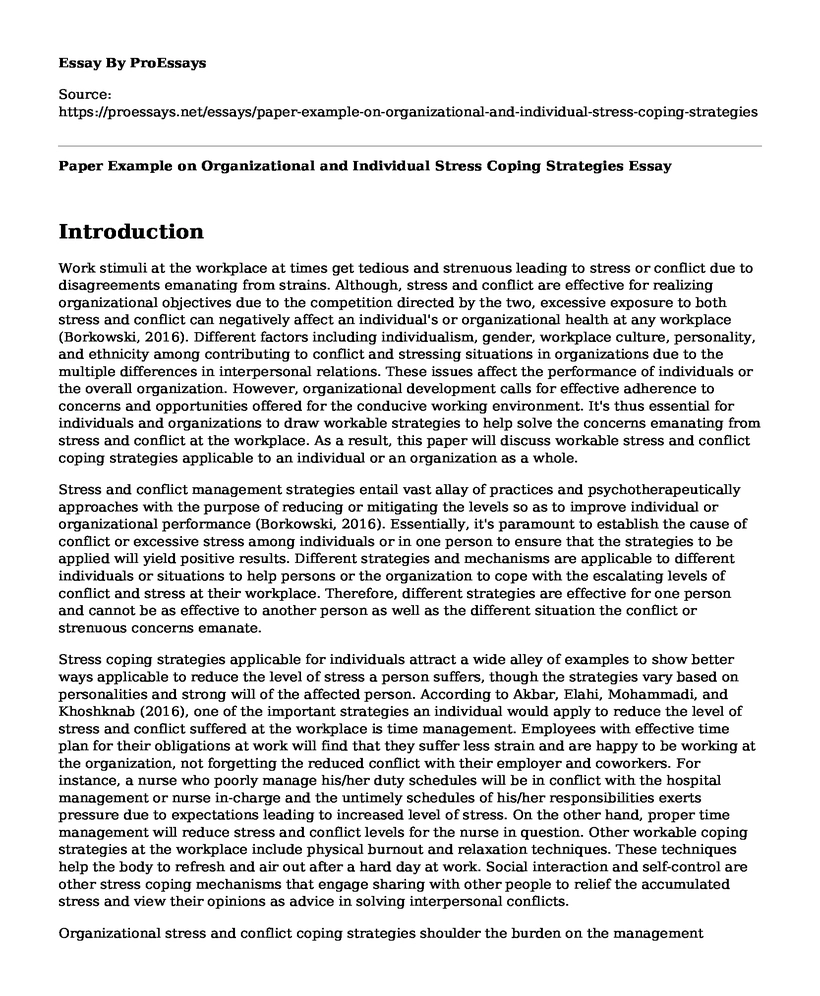Introduction
Work stimuli at the workplace at times get tedious and strenuous leading to stress or conflict due to disagreements emanating from strains. Although, stress and conflict are effective for realizing organizational objectives due to the competition directed by the two, excessive exposure to both stress and conflict can negatively affect an individual's or organizational health at any workplace (Borkowski, 2016). Different factors including individualism, gender, workplace culture, personality, and ethnicity among contributing to conflict and stressing situations in organizations due to the multiple differences in interpersonal relations. These issues affect the performance of individuals or the overall organization. However, organizational development calls for effective adherence to concerns and opportunities offered for the conducive working environment. It's thus essential for individuals and organizations to draw workable strategies to help solve the concerns emanating from stress and conflict at the workplace. As a result, this paper will discuss workable stress and conflict coping strategies applicable to an individual or an organization as a whole.
Stress and conflict management strategies entail vast allay of practices and psychotherapeutically approaches with the purpose of reducing or mitigating the levels so as to improve individual or organizational performance (Borkowski, 2016). Essentially, it's paramount to establish the cause of conflict or excessive stress among individuals or in one person to ensure that the strategies to be applied will yield positive results. Different strategies and mechanisms are applicable to different individuals or situations to help persons or the organization to cope with the escalating levels of conflict and stress at their workplace. Therefore, different strategies are effective for one person and cannot be as effective to another person as well as the different situation the conflict or strenuous concerns emanate.
Stress coping strategies applicable for individuals attract a wide alley of examples to show better ways applicable to reduce the level of stress a person suffers, though the strategies vary based on personalities and strong will of the affected person. According to Akbar, Elahi, Mohammadi, and Khoshknab (2016), one of the important strategies an individual would apply to reduce the level of stress and conflict suffered at the workplace is time management. Employees with effective time plan for their obligations at work will find that they suffer less strain and are happy to be working at the organization, not forgetting the reduced conflict with their employer and coworkers. For instance, a nurse who poorly manage his/her duty schedules will be in conflict with the hospital management or nurse in-charge and the untimely schedules of his/her responsibilities exerts pressure due to expectations leading to increased level of stress. On the other hand, proper time management will reduce stress and conflict levels for the nurse in question. Other workable coping strategies at the workplace include physical burnout and relaxation techniques. These techniques help the body to refresh and air out after a hard day at work. Social interaction and self-control are other stress coping mechanisms that engage sharing with other people to relief the accumulated stress and view their opinions as advice in solving interpersonal conflicts.
Organizational stress and conflict coping strategies shoulder the burden on the management personnel. Management control in handling stressful concerns and conflicts in the organization demand drawing of specific work objectives and goals. Some of the organizational conflicts and stresses originate from undefined responsibilities or overriding authorities, therefore, it important for the management to delegate specific goals attached to individuals' responsibilities in the organization. Decision-making process in one of the main causes of conflict and stressing situations in workplaces, it's therefore, important to enhance employee involvement in most of the organizational processes, for example, participating in key decision-making forums. Again, it's essential to improve on the communication channels to reduce conflict and stress concerns emanating from miscommunications (Ganster & Rosen, 2013).
Conclusion
In conclusion, stress and conflicts in the workplace are a healthy way of promoting effectiveness but, their excessive force diminishes individual and organizational performance. it's therefore important to come up with coping strategies to ensure they do not affect the work-related goals.
References
Akbar, R. E., Elahi, N., Mohammadi, E., & Khoshknab, M. F. (2016). What Strategies Do the Nurses Apply to Cope With Job Stress?: A Qualitative Study. Global Journal of Health Science, 8(6), 55-64. http://doi.org/10.5539/gjhs.v8n6p55
Borkowski, N. (2016). Organizational behavior, theory, and design in health care (3rd ed.). Boston: Jones & Bartlett. ISBN 978-1-284-05088-2 (Chapters 12, 13 & 14).
Ganster, D. C., & Rosen, C. C. (2013). Work stress and employee health: A multidisciplinary review. Journal of Management, 39(5), 1085-1122. doi: 10.1177/0149206313475815.
Cite this page
Paper Example on Organizational and Individual Stress Coping Strategies. (2022, May 23). Retrieved from https://proessays.net/essays/paper-example-on-organizational-and-individual-stress-coping-strategies
If you are the original author of this essay and no longer wish to have it published on the ProEssays website, please click below to request its removal:
- Application of the Attachment Theory: The Case of Levy Family
- How to Achieve Your Goals: Speech for University
- Report to the Nations on Occupational Fraud and Abuse Paper Example
- The Characteristics of Expert Teachers Paper Example
- Essay on NJ Motor Vehicles Commission: Breach of Employee Contract
- Essay Sample on Tech Workshop: A Reflection on Group Learning & Self-Development
- Essay Sample on Modern Theorists: Prahalad & Mintzberg's Focus on Human Interactions







